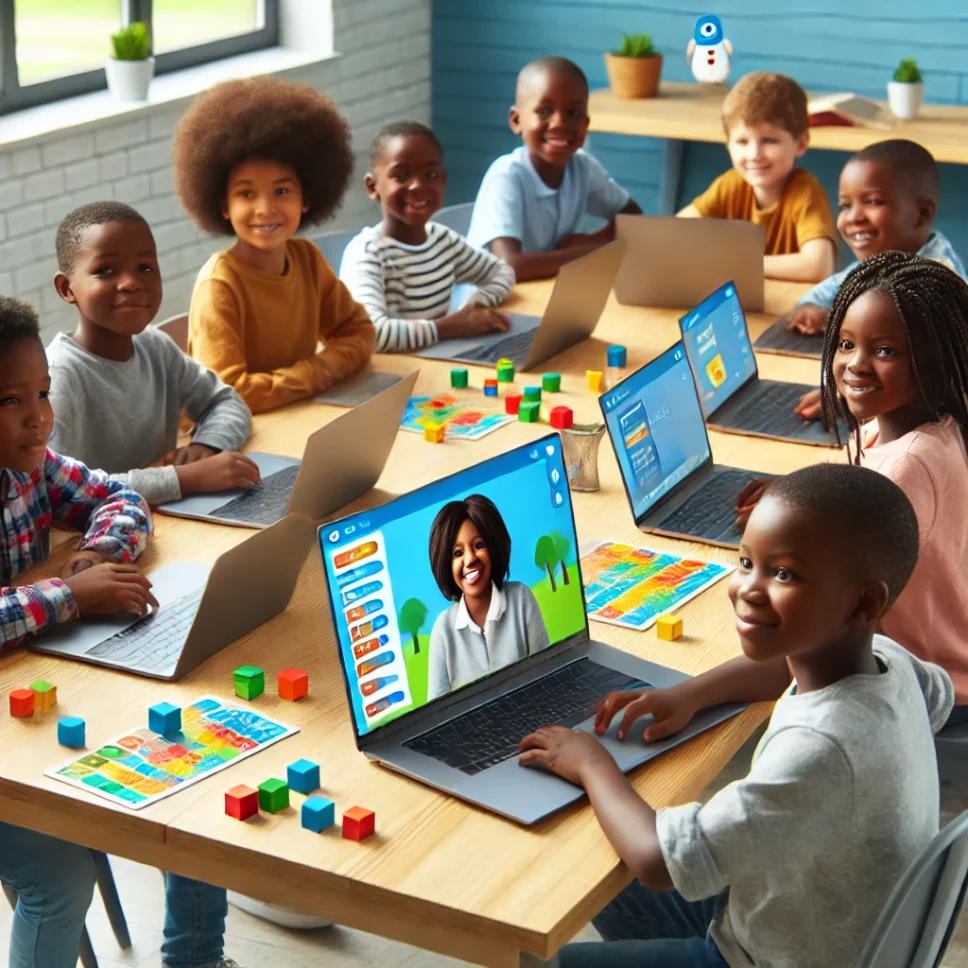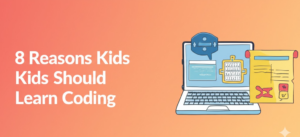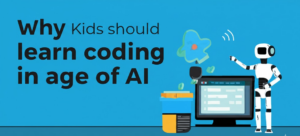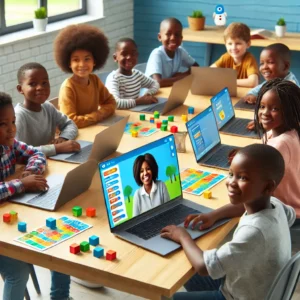Online Coding Classes for Kids: Empowering Minds
On a rainy afternoon in Nairobi, eight-year-old Amani sat hunched over a laptop, immersed in designing a vibrant digital game using Scratch. His fingers danced nimbly, bringing his creative world to life.

Coding sparkles imagination.
The Importance of Coding in Today’s World
In today’s digital age, coding stands at the forefront of the technological revolution that shapes our everyday lives.
By 2016, analysts predicted a future where technological fluency would become pivotal, emphasizing that learning coding skills would soon be a necessity.
Now, it’s not just about knowing how software’s architecture operates but developing an understanding of the coding languages that underpin various digital platforms and drive innovation.
Mastering the language of the future today, ensures that our children in Kenya are well-equipped to navigate the 21st century and seize opportunities that technology affords.
Incorporating coding education into children’s lives fosters creativity and analytical skills, building resilient problem-solvers ready to lead.
Benefits of Learning to Code Early
Embarking on the coding journey early equips children with a robust foundation for future technological endeavors and careers.
Firstly, coding at a young age promotes problem-solving skills in a dynamic digital world. This cognitive development builds resilience and fosters logical thinking, empowering young learners to approach challenges methodically. Such training transcends coding itself, nourishing intellectual growth and nurturing a mindset poised for continuous learning.
Furthermore, early coding education cultivates a creative approach to technology. By engaging with coding platforms like Scratch, children can transform their inventive ideas into reality, making complex concepts accessible and enjoyable.
Ultimately, learning to code early creates opportunities for children to establish collaborative skills and embrace teamwork. Coding clubs and workshops provide valuable social engagement, allowing young coders to interact, exchange ideas, and achieve collective goals. This nurturing environment not only enhances communication skills but also builds lasting bonds pivotal to thriving in a community-centric world.
Developing Problem-Solving Skills
Coding is more than creating software.
Engaging in online coding classes for kids instills critical thinking. The process of learning to code involves breaking down complex problems into manageable chunks, which is an invaluable part of educational development. As children encounter different levels of challenges and overcome them, they develop an astute ability to untangle problems and devise creative solutions.
Problem-solving is the heart of coding.
When children work with interactive coding for kids tools or join a kids coding club, they learn that errors, or “bugs,” are not liabilities but opportunities for growth. By reframing mistakes as integral parts of the learning journey, coding teaches perseverance and adaptability—skills that are essential in both academic and real-life scenarios.
As we’ve seen through numerous success stories, the investment in problem-solving capabilities through coding is paying off. The World Economic Forum’s 2023 report underscores the increasing demand for digital skills, including problem-solving, in the future job market. Our children, empowered with these skills, are riding the wave of change, adeptly navigating and shaping tomorrow’s opportunities.
Enhancing Creativity through Coding
Engaging in online coding classes for kids unlocks a reservoir of creativity, allowing young learners to transform abstract ideas into tangible digital creations, illustrating a symbiotic relationship between innovation and technology.
Coding empowers children to tap into their inherent creativity, allowing them to visualize new worlds and bring their imaginings to life.
Furthermore, creating vibrant animations or developing basic games with Scratch programming for kids adds a delightful visual component.
With educational coding toys for children, young minds can harness their creativity, developing unique solutions and elevating their problem-solving prowess.
Scratch programming serves as an introductory platform that ignites creative thinking and encourages a dynamic approach to learning, allowing kids to experiment and express their creativity through interactive projects.
Ultimately, the pursuit of coding provides an open canvas for a child’s imagination to flourish. Inspiring creativity now adds to the foundational skills needed for a future where innovation reigns supreme.
Digital Literacy for Kids
Mastering digital literacy is increasingly relevant today.
In an ever-evolving world where screens beckon at every turn, children must learn to thrive in this vast digital landscape. This learning extends beyond mere consumption to include understanding, creating, and innovating. Equipping our children with digital literacy for kids enables them to use technology responsibly, efficiently, and creatively.
Digital literacy prepares children for future technological advancements.
Technology’s grasp reaches far and wide – from the ways children play and learn today to future workplace innovations we can only imagine – making digital literacy integral in this tech-driven world.
Fostering digital literacy encompasses understanding technological tools, interpreting information critically, collaborating online ethically, and staying resilient amidst new challenges. As recent developments in 2023 have exhibited, the digital world spirals toward greater complexity. Our children, armed with foundational digital skills, will bridge the gap from passive consumption to active participation, paving pathways toward a future enriched by collective digital expertise.
Inspiring Future Innovators
In Kenya, as well as across the globe, nurturing the innovative minds of our young generation demands proactive efforts that intertwine curiosity, creativity, and a profound understanding of technology’s potential impact on societal advancement.
Digital literacy provides the framework through which we can cultivate this very curiosity in our children.
Children’s natural knack for exploring makes coding for kids, particularly through platforms like Scratch, a process of discovery as well as learning.
This introduction to coding not only hones computational thinking skills but also emboldens them to consider broader possibilities.
Equipped with the tools of the digital age, our children transform from merely digital participants to pioneers of technological innovation, bridging the current gap and driving us onward toward a vibrant digital future.
Ultimately, the seeds we plant in our children’s minds today, through online coding classes, yield an expansive forest of imaginative solutions, driving the regions’ quest for technological leadership.
Why Choose Online Coding Classes for Kids
In today’s fast-evolving digital landscape, online coding classes for kids are not just beneficial—they’re essential.
Since 2016, coding programs, especially those focusing on youngsters, have gained considerable traction globally due to the vast array of platforms that offer engaging and interactive learning.
Indeed, it’s no longer just about ensuring children’s proficiency in using technology, but rather equipping them with the skills to contribute to the discourse shaping our future.
Harnessing the power of the Internet, online classes present a flexible and convenient mode of learning that caters to the busy schedules of both parents and children, while providing access to global resources.
Ultimately, online coding classes ignite a passion for learning, fostering a generation that will embrace technological advancement with open arms.
Introduction to Scratch Programming
Scratch programming, a pioneer in the realm of introductory coding for kids, offers a vibrant gateway for young minds to explore.
This platform is revered for its engaging interface tailored specifically for children, transforming coding into an enjoyable activity that stimulates creativity. Armed with a user-friendly environment, Scratch empowers young learners to animate their ideas through intuitive drag-and-drop functions, making the journey into coding both accessible and rewarding.
Notably, Scratch serves as a versatile introduction to the coding world. By harnessing these foundational tools, children can effortlessly craft narratives and interactive games while embracing the essential logic and computational thinking skills that underpin complex programming languages.
Through Scratch, children embark on an exhilarating path where programming concepts translate seamlessly into imaginative digital creations. As they delve into myriad projects, they not only grasp the nuts and bolts of coding but also gain invaluable problem-solving and critical thinking abilities that will serve them profoundly in an increasingly digital society.
Coding in STEM Education
Coding has become an integral component of STEM education, redefining the landscape of children’s learning experiences.
In 2016, Kenya Vision 2030, a transformative national development blueprint, recognized that digital readiness and technological proficiency are key to shaping a competitive workforce for the future.
Now, it’s no longer enough for young learners to merely absorb information. Instead, they must interact with the burgeoning realm of technology and build the foundational skills crucial for thriving in a modern, digital world.
Integrating coding into STEM education equips children with a distinct set of skills that go beyond traditional learning. The emphasis is not solely on the core subjects but on understanding how to utilize technology as a tool for exploration, innovation, and creativity.
STEM activities that include coding cultivate an environment poised for intellectual discovery and scholastic advancement.
Fun and Interactive Coding Games
Coding games are an excellent way to harness the energy and curiosity of young learners. By immersing children in entertaining coding apps and interactive experiences, we unlock a world of endless possibilities.
In 2016, Kenya Vision 2030, a transformative national development blueprint, highlighted how digital skills are crucial for the future workforce. Equipping children with these skills through fun coding activities opens doorways to innovation.
Today, it’s not just about academic excellence. Children need to tinker, explore, and learn through engaging platforms that make coding second nature. This shift towards digital literacy is pivotal for fostering a proactive learning environment.
Games like the ones offered in our online coding classes for kids, with their creativity-oriented tasks and captivating animation, ensure that coding is not merely a subject but an adventure. Kids learn faster when they are enjoying the process and engaging interactively.
These interactive experiences ignite the spark that makes kids lifelong learners, turning play into foundational learning.
Coding Clubs and Camps for Kids
Diving into the realm of coding clubs and camps, kids discover a vibrant world of technology, fostering a progressive learning environment beyond traditional school boundaries.
These enriching spaces provide the perfect supplementary ecosystem that nurtures critical technical skills effortlessly.
Moreover, coding clubs offer a dynamic blend of learning and collaboration, fundamentally building teamwork (a cornerstone of successful technological endeavors).
Kids benefit from hands-on experiences designed to stimulate creativity and inspire innovative thinking, developing skills through coding games readily available.
These events are meticulously structured to accommodate various coding levels, from beginners to advanced, promoting personalized learning paths that cater to every child’s unique pace and potential. Coding camps also create an atmosphere where children form valuable friendships, which can be vital for personal development and increased confidence in learning.
Ultimately, the aim is to ensure every child’s passion for coding flourishes. These interactive settings empower them with skills, preparing them for future academic success.
After School Coding for Kids
Embracing technology after school allows children to delve into coding, unlocking their potential and sparking a world of possibilities.
For Kenyan parents, enrolling their children in after-school coding programs offers a remarkable opportunity to solidify skills learned during regular school hours. These classes, rich with interactive coding challenges, enable kids to apply logical thinking and puzzle-solving in ways that are both practical and entertaining.
Furthermore, after-school programs are a supportive environment where children benefit from peer collaboration. By working on coding projects in groups, they enhance both their social skills and technical acumen, ultimately fostering a balanced and holistic approach to problem-solving.
Conclusively, after-school coding sessions encourage kids to explore innovative pathways that extend beyond traditional educational boundaries. By participating in these lively and structured classes, children harness their creativity, experiment with coding projects, and gather essential skills. With the support of skilled educators, learners gain confidence, embracing challenges and transforming them into stepping stones for future success.
Coding Apps and Tools for Beginners
As the digital revolution unfolds, selecting the appropriate tools is pivotal in empowering young learners to thrive.
Firstly, Scratch serves as a quintessential gateway for budding coders, providing an intuitive platform where kids create animations, games, and stories using block-based coding. This visual programming language eliminates the complexity of syntax, allowing children to focus on logic building. Scratch’s vibrant community further extends learning opportunities, fostering collaboration.
Additionally, Tynker facilitates a seamless transition from block coding to text-based languages such as JavaScript. By offering multiple interactive games and challenges, it encourages learners to develop computational skills at their own pace. Tynker’s structured learning paths make coding relatable and accessible for beginners.
Moreover, code-centric apps like Lightbot and CodeCombat immerse children in programming concepts through captivating gameplay. These apps enrich the learning experience by blending educational content with entertainment, nurturing a positive attitude toward technology. They ultimately inspire a lifelong passion for coding, nurturing Kenya’s future innovators.
Nurturing Computational Thinking
In a world where technology reigns supreme, nurturing computational thinking in children is not just an advantage—it’s a necessity. We owe it to our children to equip them with crucial skills to succeed in an increasingly digital world.
Computational thinking enhances problem-solving and promotes critical thinking.
Platforms like Scratch and Tynker cultivate these skills by allowing children to build and explore creatively. These applications offer user-friendly interfaces that encourage kids to brainstorm innovative solutions.
Kids learn to break down complex tasks into manageable parts, honing logical thinking. They acquire skills to identify patterns, control processes, and craft efficient algorithms, fostering intuitive decision-making.
When children engage in programming, they develop resilience in the face of challenges, learning that failure is a stepping stone. This nurtures lifelong learning and a flexible mindset ready to tackle future hurdles.
Ultimately, embodying computational thinking prepares your child to be an architect of tomorrow’s world. Equip your child with this empowerment by embracing online coding classes for kids today.
Coding Curriculum for Kenyan Children
A robust curriculum is a cornerstone.
The foundation of coding for kids in Kenya begins with an age-appropriate curriculum reflecting global standards. This includes a structured journey through various stages of coding education, ensuring that each child, from beginners to more advanced, can progress at their own pace. Comprehensive modules on Scratch programming for kids, JavaScript for kids, and Python for kids ensure that the learning experience is both fun and intellectually stimulating.
Interactive platforms enhance engagement and comprehension.
Dedicated external resources like educational coding toys for children provide hands-on experiences that put newly acquired skills into practice – ensuring abstract concepts are converted into tangible, real-world applications.
Such a personalized curriculum contributes significantly towards refining both computational and creative cognitive skills, propelling our children into the dynamic digital landscape of the future. By harmoniously blending advanced learning technologies with the Kenyan educational context in 2023, children are given the map to navigate and thrive in this ever-changing environment. Encouraging children to embrace coding classes underscores our commitment to developing a generation of innovative thinkers and digital leaders. Join us in our Coding classes.




